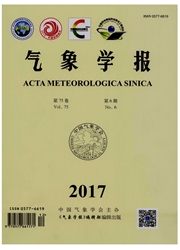

 中文摘要:
中文摘要:
利用台风年鉴、NCEP/NCAR再分析资料、旋转风及辐散风动能诊断方程对热带气旋海马(2004)的变性加强过程进行了诊断分析。结果表明,海马变性加强发生在向极运动过程中,与高空槽前急流发生耦合,西风槽引导冷空气侵人海马环流内部,形成半冷半热结构。进一步利用辐散风动能方程诊断分析发现,海马变性加强的主要能量来源有两个,一个是西风槽带来的冷空气下沉侵人低压环流释放的有效位能,另一个是海马与环境系统发生相互作用导致其低压环流不均匀分布的总动能通过辐散风向低压动能的转化。二者的值为同一量级。此外,此两种能量来源均可使海马低层平均风速在6h增加10m/s以上,地面摩擦和大气内摩擦是TC动能消耗的主要原因,而动能垂直通量的散度项使得动能由低层输送至高层。
 英文摘要:
英文摘要:
Based on the tropical cyclone yearbooks, the NCEP/NCAR reanalysis data and the kinetic energy equation of rotational and divergent wind, study is carried out of the extra-tropical transition and reintensifying of the landfalling Tropical Cyclone Haima(2004). The results show that, when moving toward the north pole, Haima couples with the jet before the upper westerly trough, which induces cold air to invade the circulation of Haima. Furthermore, the divergent wind kinetic energy equation is applied to diagnose the kinetic energy sources of the extra-tropical transition of Haima. It is found that, one of them is from the released available potential energy by cold aires invading the tropical cyclone circulation, and the other is the trans- formation from the total kinetic energy of uneven distribution in the circulation to the tropical cyclone kinetic energy via the divergent wind due to the interaction between Haima and the peripheral synoptic systems. Both are in the same magnitude, and able to enforce the low level wind of Haima increase up to 10 m/s within 6 h. The consumption of kinetic energy of the tropical cyclone is due to the land surface friction and atmosphere internal friction, and the divergence term of vertical kinetic energy flux causes the divergent wind kinetic energy to transport from low levels to upper levels.
 同期刊论文项目
同期刊论文项目
 同项目期刊论文
同项目期刊论文
 A statistical analysis on the different features of TC extratropical transition over land and ocean.
A statistical analysis on the different features of TC extratropical transition over land and ocean. Boundary Layer Structure in Typhoon SAOMAI (2006): Understanding the Effects of Exchanging Coefficie
Boundary Layer Structure in Typhoon SAOMAI (2006): Understanding the Effects of Exchanging Coefficie A Study on the Relationships between The Unusual Track of Typhoon MORAKOT(0908) and The Upper Wester
A Study on the Relationships between The Unusual Track of Typhoon MORAKOT(0908) and The Upper Wester Shear Gradient Vorticity Associated with TC Heavy Precipitation.: A High-resolution Numerical Extrat
Shear Gradient Vorticity Associated with TC Heavy Precipitation.: A High-resolution Numerical Extrat An observational study of environmental dynamical control of tropical cyclone intensity in the North
An observational study of environmental dynamical control of tropical cyclone intensity in the North BOUNDARY LAYER STRUCTURE IN TYPHOON SAOMAI (2006): UNDERSTANDING THE EFFECTS OF EXCHANGE COEFFICIENT
BOUNDARY LAYER STRUCTURE IN TYPHOON SAOMAI (2006): UNDERSTANDING THE EFFECTS OF EXCHANGE COEFFICIENT IMPACT OF UPPER-LEVEL COLD VORTEX ON THE RAPID INTENSITY AND MOTION CHANGES OF TYPHOON MERANTI (2010
IMPACT OF UPPER-LEVEL COLD VORTEX ON THE RAPID INTENSITY AND MOTION CHANGES OF TYPHOON MERANTI (2010 Intensity Change Characteristics of Tropical Cyclones in the Western North Pacific as Revealed by Th
Intensity Change Characteristics of Tropical Cyclones in the Western North Pacific as Revealed by Th Observational Analysis of Heavy Rainfall Mechanisms Associated with Severe Tropical Storm Bilis (200
Observational Analysis of Heavy Rainfall Mechanisms Associated with Severe Tropical Storm Bilis (200 THE RELATIONSHIP BETEEEN GLOBAL WARMING AND THE VARIATION IN TROPICAL CYCLONE FREQUENCY OVER THE WES
THE RELATIONSHIP BETEEEN GLOBAL WARMING AND THE VARIATION IN TROPICAL CYCLONE FREQUENCY OVER THE WES OBSERVATIONAL ANALYSIS OF ASYMMETRIC DISTRIBUTION OFCONVECTION ASSOCIATED WITH TROPICAL CYCLONES “CH
OBSERVATIONAL ANALYSIS OF ASYMMETRIC DISTRIBUTION OFCONVECTION ASSOCIATED WITH TROPICAL CYCLONES “CH 期刊信息
期刊信息
